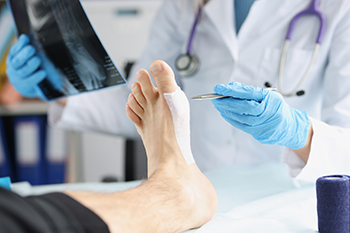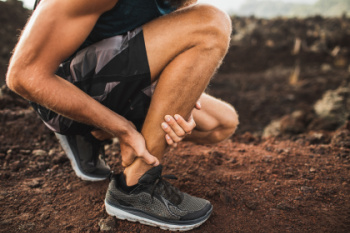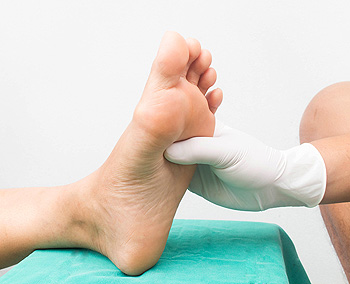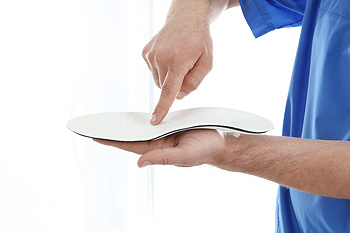Items filtered by date: September 2024
Reminder: When Was the Last Time...?
Benefits of Minimally Invasive Bunionectomies

Minimally invasive bunionectomies are transforming the approach to treating bunions, offering a less disruptive alternative to traditional surgery. Unlike conventional procedures, which involve large incisions and a lengthy recovery period, minimally invasive techniques use small incisions and specialized instruments to realign the bones. This results in less tissue damage, reduced scarring, and faster recovery times. Patients typically experience less postoperative pain and are able to resume normal activities sooner than with traditional surgery. Another advantage is a lower risk of complications, such as infection or stiffness, due to the minimally invasive nature of the procedure. It offers a more patient-friendly option with similar long-term outcomes. If you are seeking quicker recovery and less disruption to your daily life from bunion surgery, it is suggested that you visit a podiatrist to see if this minimally invasive procedure will work for you.
Foot surgery is sometimes necessary to treat a foot ailment. To learn more, contact Charles Perry, DPM of Ohio. Our doctor will assist you with all of your foot and ankle needs.
When Is Surgery Necessary?
Foot and ankle surgery is generally reserved for cases in which less invasive, conservative procedures have failed to alleviate the problem. Some of the cases in which surgery may be necessary include:
- Removing foot deformities like bunions and bone spurs
- Severe arthritis that has caused bone issues
- Cosmetic reconstruction
What Types of Surgery Are There?
The type of surgery you receive will depend on the nature of the problem you have. Some of the possible surgeries include:
- Bunionectomy for painful bunions
- Surgical fusion for realignment of bones
- Neuropathy decompression surgery to treat nerve damage
Benefits of Surgery
Although surgery is usually a last resort, it can provide more complete pain relief compared to non-surgical methods and may allow you to finally resume full activity.
Surgical techniques have also become increasingly sophisticated. Techniques like endoscopic surgery allow for smaller incisions and faster recovery times.
If you have any questions please feel free to contact our offices located in Cambridge and Zanesville, OH . We offer the newest diagnostic and treatment technologies for all your foot and ankle needs.
Causes of Achilles Tendon Injuries

The Achilles tendon links your calf muscles to your heel and is extremely susceptible to injuries, especially in people who are physically active. Achilles tendinopathy involves chronic microtears in the tendon. Acute ruptures occur when the tendon may partially or fully tear, which may feel like a sudden blow to the ankle. Symptoms range from pain and stiffness in the back of the heel to swelling and difficulty walking. Contributing factors include sudden increases in activity, wearing poor footwear, and tight calf muscles. Relief often involves keeping weight off the affected ankle, which may require crutches. Stretching and strengthening exercises and orthotics or foot taping can also provide support. In cases of a complete tear, urgent medical attention is required, and a podiatrist might recommend wearing a specially fitted boot to control ankle movement. If you have injured your Achilles tendon, it is suggested that you schedule an appointment with a podiatrist for an exam, diagnosis, and treatment options.
Achilles tendon injuries need immediate attention to avoid future complications. If you have any concerns, contact Charles Perry, DPM of Ohio. Our doctor can provide the care you need to keep you pain-free and on your feet.
What Is the Achilles Tendon?
The Achilles tendon is a tendon that connects the lower leg muscles and calf to the heel of the foot. It is the strongest tendon in the human body and is essential for making movement possible. Because this tendon is such an integral part of the body, any injuries to it can create immense difficulties and should immediately be presented to a doctor.
What Are the Symptoms of an Achilles Tendon Injury?
There are various types of injuries that can affect the Achilles tendon. The two most common injuries are Achilles tendinitis and ruptures of the tendon.
Achilles Tendinitis Symptoms
- Inflammation
- Dull to severe pain
- Increased blood flow to the tendon
- Thickening of the tendon
Rupture Symptoms
- Extreme pain and swelling in the foot
- Total immobility
Treatment and Prevention
Achilles tendon injuries are diagnosed by a thorough physical evaluation, which can include an MRI. Treatment involves rest, physical therapy, and in some cases, surgery. However, various preventative measures can be taken to avoid these injuries, such as:
- Thorough stretching of the tendon before and after exercise
- Strengthening exercises like calf raises, squats, leg curls, leg extensions, leg raises, lunges, and leg presses
If you have any questions please feel free to contact our offices located in Cambridge and Zanesville, OH . We offer the newest diagnostic tools and technology to treat your foot and ankle needs.
Effective Diabetic Foot Care

Good diabetic foot care is vital for preventing complications and maintaining overall health. Regular inspection of the feet is crucial, as diabetes can reduce sensation and make it difficult to notice injuries or changes. Feet should be washed daily with mild soap and water, and thoroughly dried, especially between the toes, to prevent fungal infections. Moisturizing the feet helps to prevent dryness and cracking, but should avoid the areas between the toes. Wearing properly fitted shoes is essential to prevent blisters and sores, and routine checks by a podiatrist can catch potential issues early. It is important to avoid walking barefoot to reduce the risk of injury. Additionally, managing blood sugar levels effectively contributes to better foot health. If you have diabetes, it is strongly suggested that you are under the care of a podiatrist who can routinely provide foot health checks, and help you to manage this condition.
Diabetic foot care is important in preventing foot ailments such as ulcers. If you are suffering from diabetes or have any other concerns about your feet, contact Charles Perry, DPM from Ohio. Our doctor can provide the care you need to keep you pain-free and on your feet.
Diabetic Foot Care
Diabetes affects millions of people every year. The condition can damage blood vessels in many parts of the body, especially the feet. Because of this, taking care of your feet is essential if you have diabetes, and having a podiatrist help monitor your foot health is highly recommended.
The Importance of Caring for Your Feet
- Routinely inspect your feet for bruises or sores.
- Wear socks that fit your feet comfortably.
- Wear comfortable shoes that provide adequate support.
Patients with diabetes should have their doctor monitor their blood levels, as blood sugar levels play such a huge role in diabetic care. Monitoring these levels on a regular basis is highly advised.
It is always best to inform your healthcare professional of any concerns you may have regarding your feet, especially for diabetic patients. Early treatment and routine foot examinations are keys to maintaining proper health, especially because severe complications can arise if proper treatment is not applied.
If you have any questions please feel free to contact our offices located in Cambridge and Zanesville, OH . We offer the newest diagnostic and treatment technologies for all your foot and ankle needs.
The Benefits of Orthotic Use in Runners

Orthotics can significantly impact a runner's speed, comfort, and injury prevention. These custom-made shoe inserts are designed to support and align the feet, addressing issues like flat feet, high arches, or pronation problems. By providing proper foot alignment, orthotics can improve a runner's biomechanics, leading to a more efficient stride and potentially increasing speed. Comfort is another key benefit of orthotics, as they can help distribute pressure evenly across the foot, reducing the risk of blisters, calluses, and other discomforts that can slow a runner down. Additionally, by correcting imbalances and providing necessary support, orthotics can prevent common running injuries, such as plantar fasciitis, shin splints, and stress fractures. For runners, the right orthotic can enhance performance by making each step more efficient and reducing the likelihood of injury. If you are a runner seeking to enhance your performance and prevent injuries, it is suggested that you consult a podiatrist to see if orthotics can help you.
If you are having discomfort in your feet and would like to try orthotics, contact Charles Perry, DPM from Ohio. Our doctor can provide the care you need to keep you pain-free and on your feet.
What Are Orthotics?
Orthotics are inserts you can place into your shoes to help with a variety of foot problems such as flat feet or foot pain. Orthotics provide relief and comfort for minor foot and heel pain but can’t correct serious biomechanical problems in your feet.
Over-the-Counter Inserts
Orthotics come in a wide variety of over-the-counter inserts that are used to treat foot pain, heel pain, and minor problems. For example, arch supports can be inserted into your shoes to help correct overarched or flat feet, while gel insoles are often used because they provide comfort and relief from foot and heel pain by alleviating pressure.
Prescription Orthotics
If over-the-counter inserts don’t work for you or if you have a more severe foot concern, it is possible to have your podiatrist prescribe custom orthotics. These high-quality inserts are designed to treat problems such as abnormal motion, plantar fasciitis, and severe forms of heel pain. They can even be used to help patients suffering from diabetes by treating foot ulcers and painful calluses and are usually molded to your feet individually, which allows them to provide full support and comfort.
If you are experiencing minor to severe foot or heel pain, it’s recommended to speak with your podiatrist about the possibilities of using orthotics. A podiatrist can determine which type of orthotic is right for you and allow you to take the first steps towards being pain-free.
If you have any questions please contact our offices located in Cambridge and Zanesville, OH . We offer the newest diagnostic and treatment technologies for all your foot and ankle needs.

